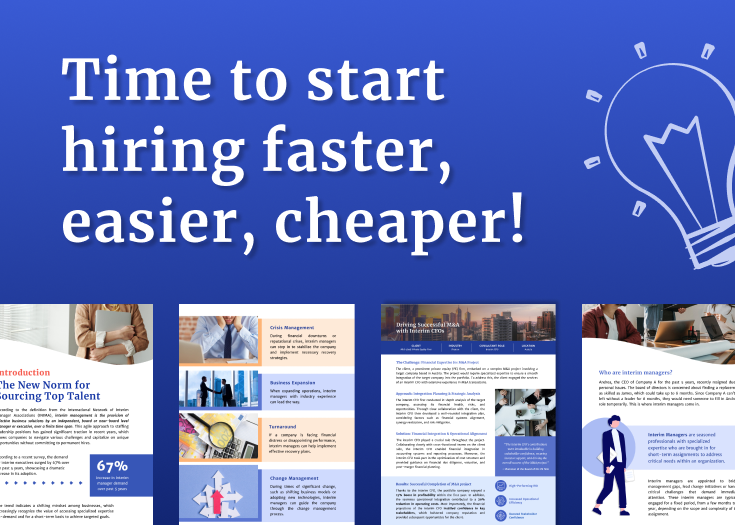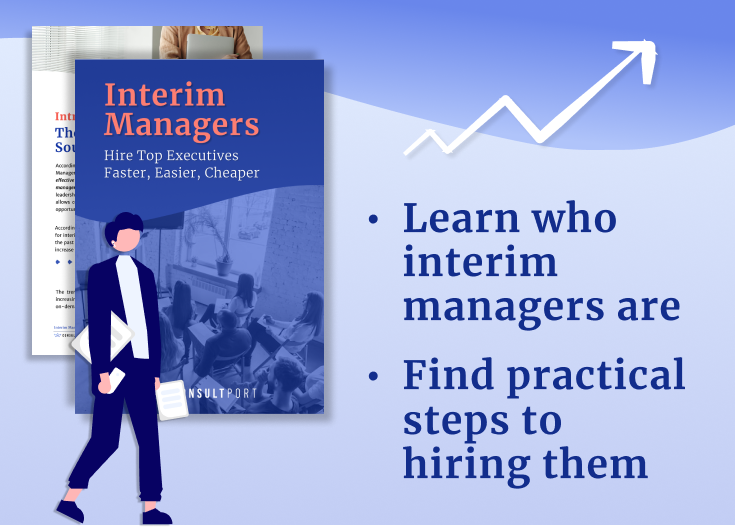What is the definition of interim management?
Interim management is the provision of effective business solutions by experienced professionals over a finite time span to address critical needs and challenges within an organization.
Why are businesses increasingly turning to interim managers?
Businesses are turning to interim managers due to their specialized expertise, cost-effectiveness and objectivity. This enables businesses to address urgent needs and capitalize on opportunities without committing to permanent hires.
When should businesses consider hiring an interim manager?
Businesses mostly hire an interim manager during leadership transitions. Other common assignments include crisis management, business expansion, turnaround, and change management.
How can businesses ensure a successful engagement with an interim manager?
How can businesses maximize the value of an interim manager's expertise beyond their tenure?
To maximize the value of the interim manager, regularly monitor their progress and impact. Furthermore, encourage knowledge transfer through documentation and mentoring. Finally, align the interim manager’s work with long-term organizational goals.
Which type of interim manager has been the most hired in 2025?
In 2025, interim CFOs and
fractional CFOs have emerged as the most sought-after professionals. This is largely due to increased financial uncertainty, frequent restructuring, and the need for experienced leadership in financial planning and risk management. Companies are relying on
finding interim CFOs to navigate complex transitions while maintaining fiscal health and investor confidence.
What industries benefit the most from interim management?
Industries experiencing rapid transformation or regulatory pressure—such as healthcare, finance, technology, and manufacturing—often see the greatest gains from interim management. These sectors face unique challenges that require swift, strategic responses and experienced leadership. Interim managers bring critical expertise without the delays of a permanent hiring process.
What is the typical duration of an interim management assignment?
Most interim management assignments last between 3 to 12 months, though this can vary depending on the project's scope and complexity. Shorter assignments are common for urgent crisis management or bridging leadership gaps, while longer engagements often support major transformation initiatives. The duration is typically tailored to align with specific organizational goals.
How quickly can an interim manager be onboarded?
Interim managers can often be onboarded within a matter of days, depending on availability and project urgency. Their ability to integrate quickly is a key advantage, as they are used to stepping into unfamiliar environments and delivering results rapidly. This swift deployment helps minimize business disruption and accelerates the path to solutions.
What skills should businesses look for in an interim manager?
Businesses should look for proven leadership experience, industry-specific knowledge, and strong change management capabilities. An effective interim manager should also demonstrate strategic thinking, adaptability, and excellent communication skills to align quickly with stakeholders. Soft skills, such as emotional intelligence and resilience, are equally vital for navigating complex team dynamics.
Can interim managers handle confidential or sensitive projects?
Yes, interim managers are often brought in specifically to handle high-stakes, confidential, or sensitive projects. With their independent status and objective viewpoint, they can operate discreetly and make tough decisions without internal bias. Their professional integrity and focus on results make them a trusted resource in delicate situations such as M&A, restructuring, or executive transitions. As more companies are struggling to
stay financially stable, with Chapter 11 bankruptcies rising by 68% in 2023
interim chief restructuring officers are getting more and more hired in 2025.
How do interim managers differ from consultants?
While both interim managers and consultants bring specialized expertise, their roles and approaches are quite different. Interim managers are embedded directly into the organization, often stepping into executive or operational roles with full decision-making authority. They take responsibility for delivering outcomes, leading teams, and managing change from within. Consultants, on the other hand, typically work externally and focus on providing strategic advice, research, or recommendations. They are not usually accountable for execution or results in the same way an interim manager is. This makes interim managers particularly effective in urgent, high-impact scenarios where leadership continuity, quick decision-making, and hands-on management are essential.
 Join thousands of professionals using this resource
Join thousands of professionals using this resource











